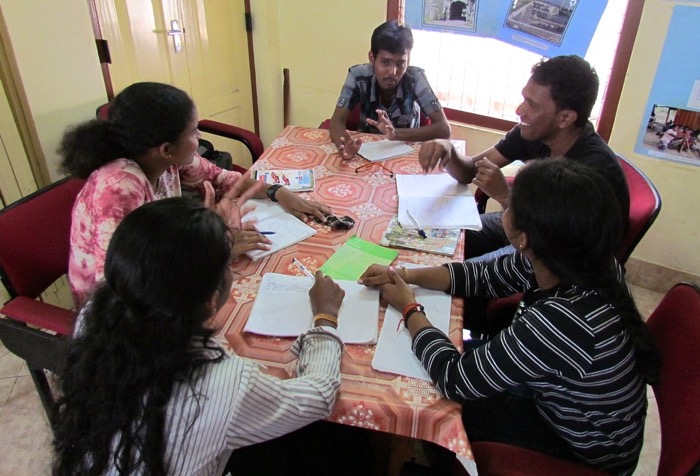
Here we offer 50 suggestions for helping editors run stimulating news meetings that guarantee a steady stream of original stories.
Have you ever attended a dull news meeting where people are slouched on chairs, lacking ideas and unresponsive when called on?
It’s not a healthy atmosphere for getting the news juices flowing. And it’s all down to the editor to generate enthusiasm, engagement, and contributions.
The editor will need to have a clear idea of the outcome they want, while also encouraging participation from every member of staff.
There should be no hiding places, no scapegoats and no favourites.
There needs to be a sense that every news meeting will unearth several news story ideas in the category of “had it not been for you the world would never have known“.
If you are the editor, your staff need to know that it’s not worth turning up if they don’t have original ideas to contribute.
So, here are some suggestions for running an effective news meeting.
- Attention: Meet standing up or sitting on hard seats, not slouching on sofas.
- Punctuality: Be punctual and start on time, even if all have not arrived.
- Urgency: Create a sense of urgency and set a time limit for the meeting.
- Pace: Keep things moving and avoid silences by injecting your own ideas.
- Vision: Have a clear outline of what YOU think the news day should look like before you start the meeting.
- Preparation: Encourage staff to read their own site/publication and the competition before the meeting. They should not be catching up during the news meeting.
- Alert: All attending should be totally across what you and your competition are covering and should have already thought through the next steps in the story AND come up with some original angles to explore.
- Expectations: Ensure staff realise that they are expected to find news, not be given it on a plate. If you run a new meeting like a soup kitchen, where staff will be spoon-fed and given hand-outs (news releases to rewrite), you will reduce the incentive to come up with original ideas.
- Distractions: Ban texting or phone calls (unless they are to do with a developing news story) during the meeting. Those attending should give it their full attention.
- Discipline: Discourage private conversations during the meeting; if someone has something to say ensure they address the whole group.
- Competition: Instil a sense of competitiveness in the meeting. People should be fighting to get their ideas accepted.
- Clarity: Speak loudly and clearly, don’t drone. You need to make sure you are understood and that those contributing are, too.
- Humour: Use humour where possible without trivialising the seriousness of the task in hand. Journalism should be fun as well as serious.
- Enjoyable: Make sure the meetings are enjoyable; they set the tone for the day. The meeting should motivate staff.
- Participation: Generate an atmosphere of participation rather than one where people want to hide. This is best achieved by asking people how the news should develop rather than reading out a long, boring list of events.
- Recap: At the end of the meeting, recap on the top stories and how they are to be developed. It’s easy for a busy meeting to become confusing. When it ends, staff need to know exactly what they need to do.
- Planning: Be across the day’s prospects and planning diary and have copies printed out for all staff.
- Review: Spend five minutes asking what could have gone better on the last shift. Don’t dwell on issues, but make sure that mistakes are corrected and your output continues to improve.
- Congratulations: Mention where your news team beat the opposition the previous day, try to pinpoint why and celebrate success.
- Praise: Make sure you praise what was done well, not just the correspondent but the camera crew, the photographers, the producers and the editors. Blowing your team’s trumpet for them is a great motivator.
- Recognition: Show that you understand the difficulties of newsgathering and what your team went through to produce the previous output. Most editors will have worked in the field; it’s important your staff know you appreciate the issues they face in doing their jobs.
- Teamwork: Stress continually that it is a team effort and everyone needs each other. Where there has been noticeable collaboration, say so and help others realise that, by working together, the quality of output will improve.
- Responsibility: Encourage shared responsibility for all output. You are as strong as the weakest member of the team and everyone needs to support one another.
- Respect: Never criticise a member of staff in front of his or her peers. If you have an issue with someone, have a word with them later. Respect that there may be factors that you are unaware of and be sure to take time to understand why problems happened.
- Correction: You have a responsibility to follow up on mistakes for the sake of those who made them and those who were affected by them, but always tackle failures in a separate meeting; they are not always best dealt with in the daily news meeting.
- Offline: Don’t waste time with conversations that can be dealt with after the meeting. Make it clear what can be discussed in the news meeting and what should be dealt with offline.
- Follow up: Allow time for brief one-to-one chats after the meeting ends if staff are unclear. Some may feel uncomfortable asking for clarification in public. Set aside 15 minutes after the meeting for anyone who needs extra briefing.
- Improve: Instil a culture of daily improvement and advancement. Ensure everyone learns from every mistake and set action points for improvements.
- Sensitivity: Recognise that few staff operate to 100% capacity for every minute of every shift. What is important is that deadlines are met and the quality of the content produced is consistently high. These is the benchmarks of performance, not the ebb and flow of effort leading up to publication.
- Understanding: Don’t belittle people; personal criticism will undermine the individual and damage the team. It is unprofessional.
- Encouragement: Everyone has their strengths; it is your job to identify and draw those out so that they may be deployed to best effect within the team effort.
- Inclusiveness: Encourage participation, welcome all ideas and don’t mock any. Some great ideas are often poorly presented at first.
- Awareness: The news meeting isn’t a sermon. It’s about you drawing on the skills and the knowledge of the team you have hired. Make sure you bring the quiet ones into the conversation, they may have the most to offer.
- Ideas: Ensure that everyone realises that the news meeting is about ideas, not about prospects and diary dates. Always start by asking what ideas people have for new angles to existing stories.
- Exclusives: Ask them what exclusive stories they are working on. As stated earlier, they should all be working on stories that “had it not been for them, the world would never have known”. Your job is to help them develop those ideas.
- Investigations: Ask them what stories they would like to be able to work on. Check ‘Shoe-leather reporting‘ which contains our 24 tips for journalistic productivity.
- New angles: You need to come to the meeting with your own idea of what the day’s news output might look like. You will have thought through at least one new angle for all the main stories. If it goes quiet, and it shouldn’t if you follow the 36 tips above, you may need to stimulate the debate by offering your ideas. Check our article on ‘How to develop important news angles‘.
- Setting priorities: Ensure that all understand the agreed priorities for the day and that all work towards realising them.
- Clarifying roles: Ensure all understand their roles and responsibilities. When you’ve briefed your team, ask each one to tell you what they will be doing. This will confirm whether or not they have understood their tasks for the day. Clarification immediately after the meeting can save problems later.
- Multiple perspectives: Don’t allow anyone to hog the conversation. You will have recruited a diverse news team, and you need to reflect that diversity in all output.
- Inclusiveness: Don’t allow any hiding places. Pick a room for your news meeting where you can see everyone and everyone can each other.
- Time management: Avoid dwelling on an item too long, people get bored and if your journalists get bored your audience is unlikely to find the story interesting either.
- Decisiveness: Ensure that decisions are made and move on. A presentation board gives a meeting focus and highlights the main points covered.
- Deliverables: Ensure that everyone knows what they need to do and when they need to do it. Everyone needs to know their part in the production process, particularly the dependencies where their failure could cause difficulties for others.
- Agreement: End with a sense that all main issues were tackled, even if some have to be taken offline for further clarification.
- Complete: Don’t end a meeting with loads of loose ends. If you do, staff will be confused. They need to leave the meeting with a sense of purpose.
- Summary: Sum up at the end with a clear outline of how you expect the day ahead to develop.
- Leadership: You are in charge, but your team must leave the meeting knowing that you are flexible, understanding and open to a change of direction if news developments warrant it.
- Follow up: A follow-up meeting later in the day will allow you to see whether you are on track to meet your deadlines and, if not, this is the time to take corrective action.
- Thank you: End the meeting by thanking everyone for taking part – and mean it.








